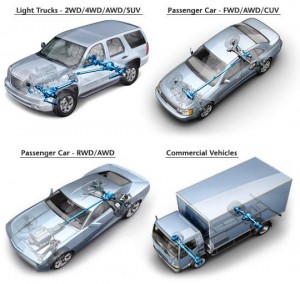General Motors Company has agreed to bailout American Axle & Manufacturing Holdings Inc. by giving the key supplier $110 million in exchange for an equity interest in the company it once owned.
Critics have maintained GM sold American Axle for song at a corporate garage sale in the early 1990s, but GM continues to be AAM’s largest and most important customer, accounting for almost 80% of its sales in the second quarter.
American Axle also was forced by its creditors to agree to several restrictions on its operations.
The company’s management outlined the changes in a filing with the Securities Exchange Commission Thursday where it disclosed the terms of the renegotiated covenants.
AAM will be required to comply with revised financial covenants stipulating that it maintain an average daily minimum liquidity of $85 million until June 30, 2010. Without the revised agreement, creditors could have forced AAM into bankruptcy.
AAM expects to post a profit for the third quarter and its sales to total about $400 million, according to the SEC filing, as production at GM resumes.
The amended credit agreement, however, limits AAM’s ability to make certain investments, declare or pay dividends or distributions on capital stock, redeem or repurchase capital stock and certain debt obligations, incur liens, incur indebtedness, or merge, make acquisitions and sell assets.
As part of the deal, AAM received a $110 million payment covering costs associated with contracts assumed and/or terminated by Motors Liquidation Company (the Old GM now in receivership) in its Chapter 11 bankruptcy cases.
The agreement resolved outstanding commercial obligations between AAM and GM. It also required AAM to amend terms and conditions to be more consistent with GM’s standard terms and conditions with other first-tier suppliers.
In return for the $110 million, GM is getting warrants to purchase 6.9 million shares of American Axle stock at $2.76 per share, which is well below the company’s current share price of about $8. Its 52 week low was 26 cents.
The agreement also protects GM’s interests if American Axle is forced into bankruptcy in the future.
Under the agreement, GM has access to certain real estate and intellectual property used in production of GM component parts. GM also has guaranteed access to the operating assets and real estate used to manufacture, process and ship GM component parts produced at AAM facilities that manufacture component parts for GM for a period of up to 360 days after invoking this right.
GM also has the right to assign component part production to other suppliers if American Axle defaults.


In an SEC filing on September 25, 2009 GM Company said it acquired Warrants for the purchase of 4,093,729 shares of Common Stock of the Issuer (the “Warrants”) on September 16, 2009. The Warrants are exercisable at any time prior to September 16, 2014, 5:00 p.m. New York City time, at an exercise price of $2.76 per share. The exercise price and the number of shares issuable upon exercise of the warrants are subject to adjustment pursuant to that certain Warrant Agreement, dated as of September 16, 2009, by and between the Issuer and the Reporting Person (the “Warrant Agreement”).
Pursuant to the Warrant Agreement, the GM has agreed that, except for a limited period after any exercise of the Warrants before the 30th day preceding the Warrant expiration date, it will vote any shares of Common Stock acquired upon exercise of the Warrants (the “Warrant Shares”) proportionally with all other stockholders of the Issuer. In addition, pursuant to the terms of the Warrant Agreement, while the GM (or any of its affiliates) holds any Warrants or Warrant Shares, the GM has agreed that, among other things, neither it nor its affiliates will, without the prior written consent of the Issuer, (a) acquire, directly or indirectly, any securities if, following such acquisition, GM and its affiliates would be the beneficial owners of more than 20% of the then outstanding Common Stock, or (b) seek, propose or take other action, whether by itself or with others, for the purpose of, directly or indirectly, influencing or controlling the management or policies of the Issuer.